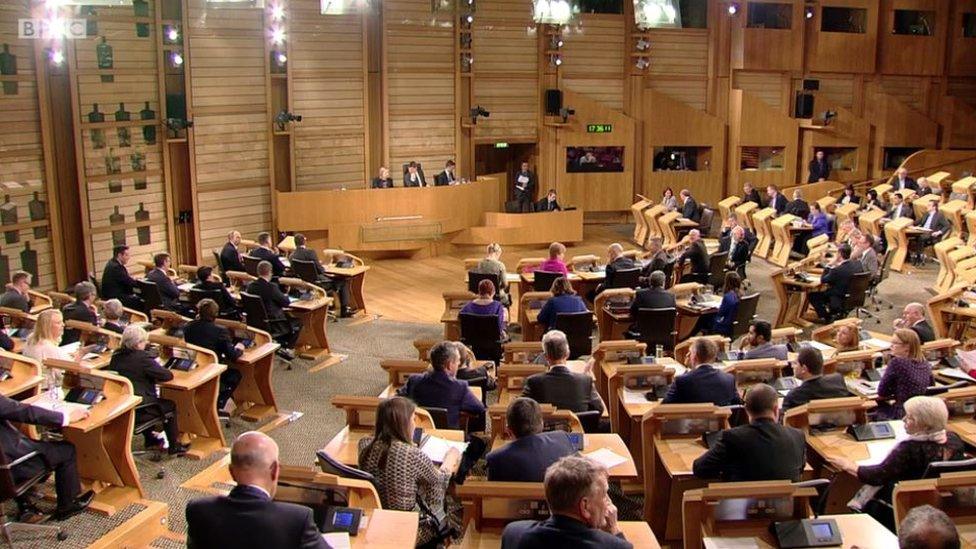Scotland's budget: anyone for chess?
- Published
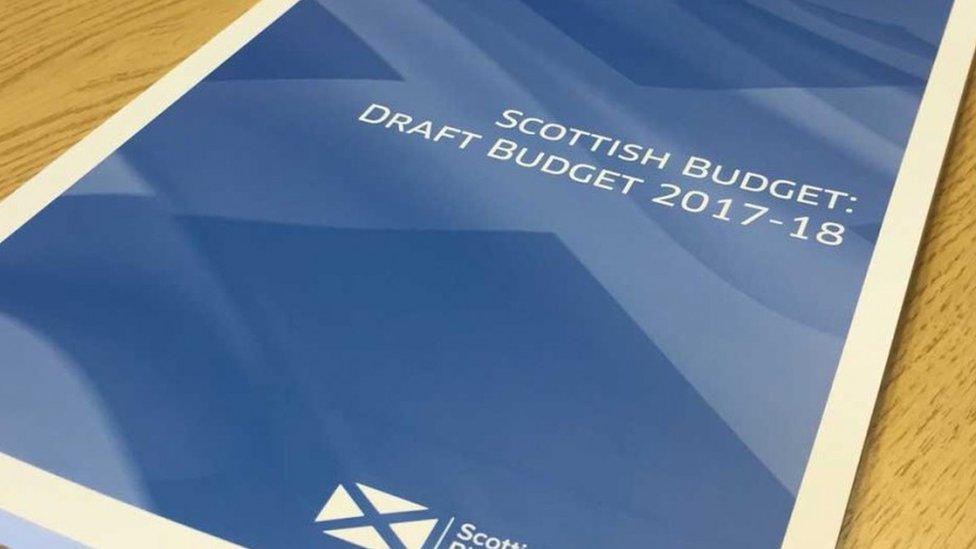
The first vote on the budget will be on Thursday
While a youth, I was rather keen on chess, my native Dundee being the global capital of that fine game, among many other things. However, I have always shied clear of the multi-dimensional version.
Which is a pity because it would have readied me for attempting to follow the contest of comparable complexity currently taking place at Holyrood anent the negotiations over the Scottish Government's budget.
Regular readers of these meanderings will be familiar with the dramatis personae in this tale. But perhaps a brief update might be useful for any newbies. (The regulars can deploy the brief interval making tea or watering the hydrangea, according to taste).
Anyway, Derek Mackay, the finance secretary, is trying to secure parliamentary backing for his Budget Bill, external which encompasses the Scottish government's spending and tax plans for the year ahead.
But he needs chums - or even just a solitary pal - because the SNP lack a majority at Holyrood. The prospect of a deal with the Tories or Labour is next to zero.
The Tories won votes by standing firmly against independence - and are less than inclined to support the principal promulgators of said objective now. Labour's underlying fear is that they are being supplanted by the SNP: they do not want to hasten that trend by acting as a subset in budget votes.
Budget blockage?
Which leaves the Greens and the Liberal Democrats. As I write, the latest round of talks with the Greens is imminent. The Lib Dems are due in tomorrow.
All up to speed? Tea made? Hydrangea moist? Grand. Let us look ahead to Thursday - and the Stage One vote on the Budget Bill. As ministers glance forward to that prospect, they "guess and fear", to quote the Bard.
Right now - I stress, at this precise moment - the expectation in a number of quarters is that Parliament may vote No on Thursday; that MSPs may reject the Bill.
The calculation by some is that there is genuine division between the parties over tax and spending. The argument then goes that it might be better to confront that openly now - rather than letting the Bill proceed, only to run into trouble at later stages.
If - to repeat, if - the Budget Bill is defeated at Stage One, it does not vanish into the maw, unlike other legislation. It can be brought back - either reformed or defiantly unchanged - for another go.
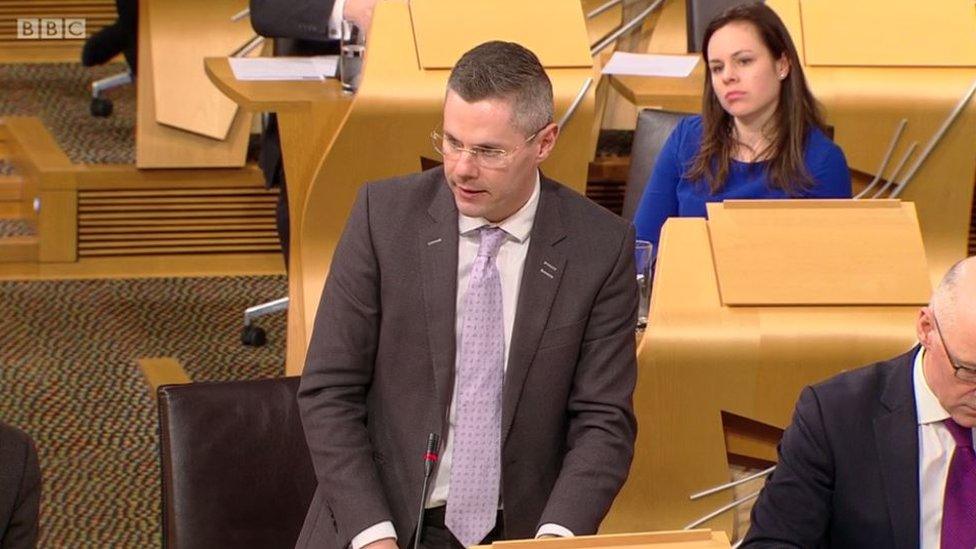
Derek Mackay has defended his plans as "a budget for growth and public services"
So, alternatively, what are the prospects of a deal? It is still being actively examined and all participants stress privately that Derek Mackay is pursuing those negotiations in good faith, efficiently and with notable diligence.
The Liberal Democrats want around £400m diverted to spend on mental health, police, education and Northern Isles transport. Of that, roughly half would be taken up by improving mental health care: a topic persistently pursued by Willie Rennie, the party's leader in Scotland.
To be clear, their tax stance also differs from the SNP but they are majoring, for now, on spending.
In response, the Scottish government says the cash demand is too high - and that the mental health provision in particular would require substantial additional staffing. Which, they argue, cannot reasonably be provided instantly.
Mr Rennie and his colleagues continue to negotiate. But it was no accident that he suggested to BBC Scotland at the weekend that there might well be no deal, resulting in a possible early Holyrood election. He was deliberately testing whether such a prospect might fly with the public - or whether his party would attract particular opprobrium.
There is a further fundamental obstacle. The Liberal Democrats support the Union. A federal Union, admittedly, but the Union between Scotland and England.
That stance means, they argue, that they need significant concessions on spending and/or tax in order to cross the constitutional bridge and support the SNP. A party whose raison d'être is to end the Union, who are again actively canvassing the prospect of a referendum.
In short, the Lib Dems fear they risk engendering public anger: not a smart thing to do with local elections pending in May.
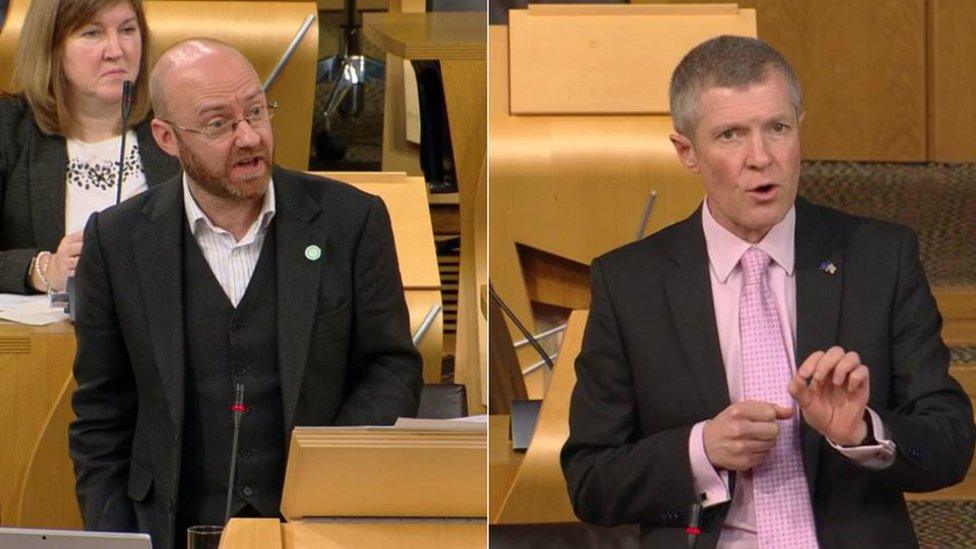
Patrick Harvie's Greens and Willie Rennie's Lib Dems are likely partners for a budget deal
And the Greens? They are negotiating seriously and in detail - although they want movement on tax, as well as spending.
Not, perhaps, their entire policy: such would scarcely be credible or reasonable. But they want movement in a "progressive" direction, movement towards proportionately increasing the burden upon higher earners, beyond the change already canvassed by Ministers.
Derek Mackay hears that case - but is presently reluctant to give ground. For one thing, the SNP depicted their tax plans during the Holyrood election as a carefully calibrated package. To unpick it would be to counter that impression.
For another, such a move would not be politically neutral on the other side. Yes, it might placate the Greens and secure their support. It might resonate with many SNP activists and voters. But it would risk annoying those who would fall liable for the tax - middle-class and aspirational voters who might then find a home with the Tories.
That might, arguably, be the case in areas like Perthshire, the North-east, Edinburgh, the Borders and Argyll - where the SNP are currently strong and ambitious.
The independence element
Certainly, the Tories are already preparing their arguments - to the effect that, from their perspective, the first response of the SNP, when up against it, is to punish "hard-working families". Rightly or wrongly, that is how the Tories would play the issue with the voters.
There is another element. The Greens, being supporters of independence, do not have the Lib Dem problem of backing a party which is inimical to their constitutional standpoint. But they may face the mirror image problem.
Arguably, there were people who voted SNP on the constituency ballot paper for Holyrood - but who switched to the Greens on the second vote as a back-up.
Would those voters feel aggrieved if the Greens fail to back the SNP budget and, ultimately, bring down the Scottish government, fostering a further election?
Alternatively, could the Greens persuade people that the SNP has been too timid in office with regard to taxation in particular?
Chess, anyone?
- Published30 January 2017
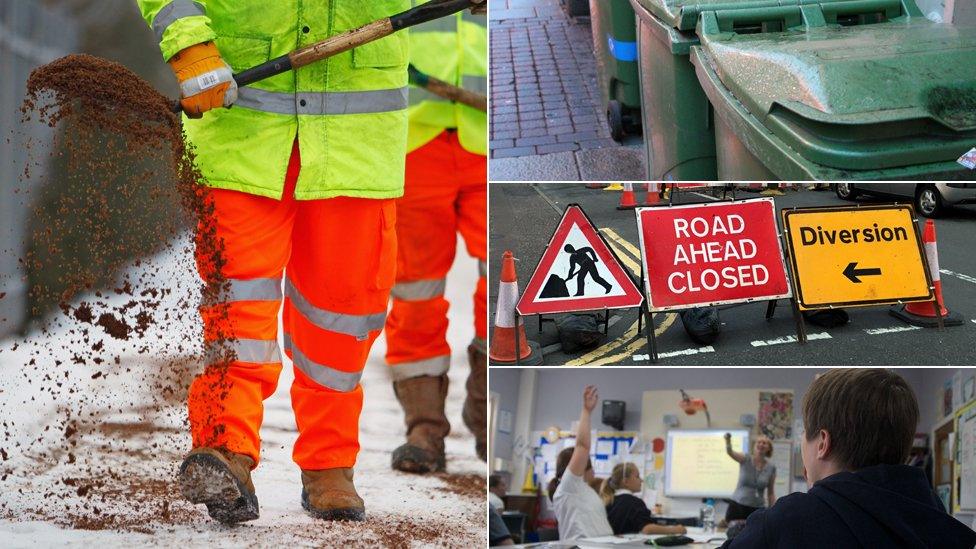
- Published25 January 2017
